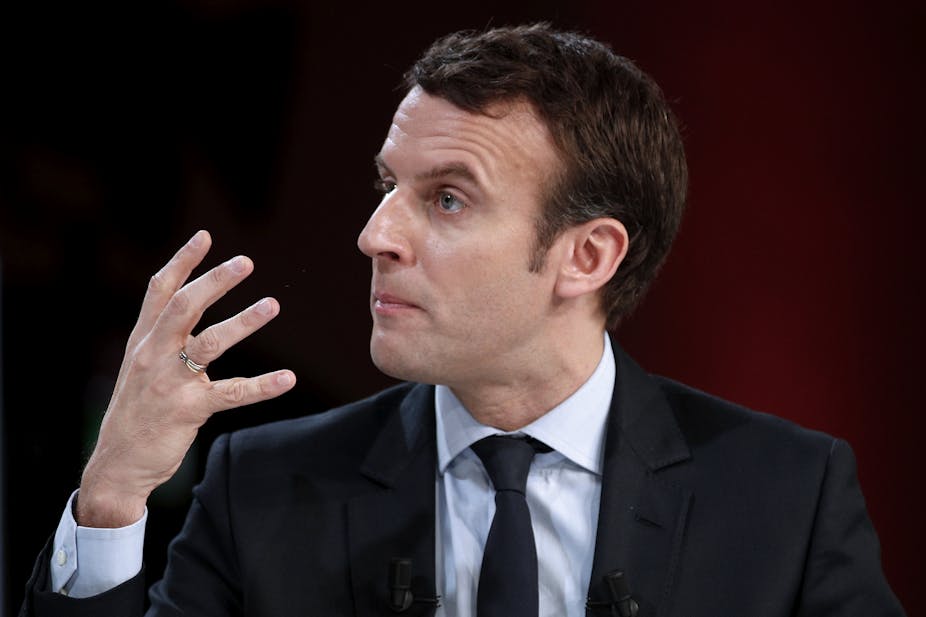Emmanuel Macron has suddenly found himself as the new poster boy of Europe’s beleaguered political centre. The insiders’ outsider, if you like. From Marseille to London thousands have been flocking to hear this insurgent presidential candidate for the French speak.
But just as pundits began to accept the bid from the former investment banker and minister of economy during the first half of François Hollande’s presidency, a new controversy about the interpretation of colonial history has tested Macron’s electoral appeal, and demonstrated that France’s colonial ghosts are alive and kicking.
On February 15, in an interview with the TV channel Echorouk News during a visit to Algeria, Macron followed protocol and spoke about his desire to “build a bridge” between France and its former colony. But in doing so, he addressed the subject of colonialism. He backtracked on a previous comment about the “richness” of colonial Algeria to brandish colonialism a “crime against humanity”.
Losing no time, a choir of commentators from the right interjected to castigate Macron for his “shameful” lack of patriotism. François Fillon, the candidate for the centre-right Les Républicains, sensed an opportunity to divert attention from his own scandals to brandish Macron’s words as “hateful” of France, and demonstrating that he had “no spinal cord”.
To dramatise things further, Macron was on his way to the southeastern France, an area where there is substantial support for the right-wing Front National, led by Marine Le Pen. The region has a large concentration of pieds-noirs, or former European settlers from Algeria, who still nurture a sense of resentment over French “abandonment” of its colony. As scenes of a demonstration of pied-noir activists in the town of Carpentras reached the press, this latest spat turned into a full-on controversy and Macron suffered in the polls.
Macron’s fragility
This chain of events reflects Macron’s volatile position as the centrist in this election campaign. The former-socialist-turned-independent has succeeded in detaching his public image from his record as a minister in the Hollande government. His forward-looking attitude stands in sharp contrast to the projects of political nostalgia of Le Pen and Fillon. He has succeeded in attracting a truly diverse coalition of voters from left and right alike.
This success, however, is fragile. Recent polls show that only 33% of voters who consider voting for Macron are sure they will do so on election day, while his centrist position has attracted comments on Twitter such as: “Trying to be everywhere, he ends up being nowhere.” In this context, remarks about colonial history seemed to be a way for Macron to appeal to a younger, left-leaning electorate by talking about social issues beyond his normal focus on economic reform.
At first glance, Macron’s initial comments align with condemnation of colonial history that has become a marker of France’s political left in recent years. In 2005, the then left-wing opposition belatedly united to oppose a government bill, initiated by pied-noir associations, which ordered schools to stress the “positive role” of France’s “overseas presence”. The law was eventually dropped but the debate that emerged created new political fronts.
The right wing UMP (which has since changed its name to Les Républicains) ignored its history as the party of Charles de Gaulle, the president who had signed the 1962 Evian Agreements and retreated from Algeria to support the law. At the same time, the socialists skirted over their party’s historical support of colonialism and the Algerian War to portray themselves as a party of inherent anti-colonialists.
This same dynamic continued in 2012. Shortly after winning the presidency, Hollande organised a state visit to Algeria, in which he expressed his regrets over the “profoundly unjust and brutal” colonial system. Left-wing reactions to his speech back in France celebrated him as a part of the “left without complexes or compromises on the subject of the country’s colonial past”. Meanwhile, the same right-wing politicians who had initiated the 2005 law deplored his act of “repentance”.
A loaded term
Even Macron’s use of the term “crime against humanity”, which many observers denounced as inappropriate, goes back to a series of legislative actions to re-define France’s colonial past, most notably the 2001 law brought forward by the socialist Christiane Taubira that defined transatlantic slavery as a crime against humanity. In this context, it is unsurprising that France’s current minister for families, Laurence Rossignol, declared that Macron’s words were a way to “declare his affiliation to the left” by stressing his “anticolonial” credentials.
Macron’s reaction to the controversy suggests he had not intended to take a stand on a decidedly anti-colonial platform. On February 18, in Toulon, another pied-noir centre in southeastern France, he paraphrased an old speech of De Gaulle in Algeria as he backtracked and apologised to those offended by his first analogy: “je vous ai compris” (I understood you).
Macron’s foray into the politics of memory was ill-conceived at best. Over the last decade, the debate about colonialism has exacerbated the polarisation of French politics and left no space for a search of any middle ground. In entering this quagmire, Macron was destined to be pulled into a barren debate about a “balance sheet” of colonialism where politicians express political allegiances by addressing France’s historical past as simply “good” or bad".
Nonetheless, there might be another reason for Macron’s initial stance: his age. Unlike most voices in these loud fights about colonial history, Macron is too young to have experienced any of the events of decolonisation and its aftermath first-hand. He grew up in a society that engaged with the memory of colonialism rather than with its actual violence. As such, he is comfortable speaking about “facing up to history”, thinking that colonialism truly is consigned to the past. This could be the position of a true centrist in 21st century France.

